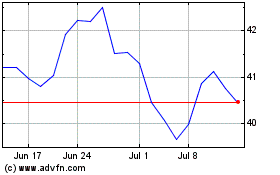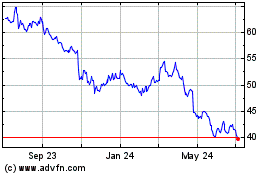Samsung Nears European Approval for Near-Replica Version of Arthritis Drug
April 01 2016 - 12:30PM
Dow Jones News
SEOUL—The Samsung Group's drug-development arm said it is on
track to win European regulatory approval for a knockoff version of
Johnson & Johnson's blockbuster rheumatoid arthritis drug
Remicade, marking a second straight victory for the South Korean
conglomerate's fledgling ambitions in biologic drugs.
Samsung Bioepis Co., which the technology-focused conglomerate
founded four years ago to develop near-replicas of existing
biologic drugs, said in a statement that it received a positive
opinion on its drug from the European Medicines Agency, clearing
the way for European Commission approval.
Earlier this year, Samsung Bioepis won approval from the
European Commission for its near-replica of Enbrel, another
top-selling rheumatoid arthritis drug.
Samsung Bioepis started selling selling its near-replica of
Enbrel under the Benepali name in Europe this year, in partnership
with Biogen Inc., at a steep discount to the original drug's price.
Enbrel's patent expired in Europe in August. In Norway, where the
government sets drug prices at public hospitals, Benepali sells for
about half the price of Enbrel.
Remicade and Pfizer Inc.'s Enbrel each generate about $9 billion
in revenue a year, making them two of the five best-selling
biologic drugs in the world.
In addition to these two drugs, Samsung Bioepis has finished
Phase 3 clinical trials of a near-replica of AbbVie Inc.'s Humira,
the world's top-selling prescription drug last year, which had $14
billion in global sales.
Unlike simpler, chemically synthesized drugs like aspirin,
biologic drugs are made from living cells to treat a variety of
ailments ranging from cancer to arthritis. Biosimilars are
near-replicas of biologic drugs that are akin to the generic
versions of chemically synthesized drugs, offering similar
treatments at lower prices.
Samsung's third-generation heir apparent, Lee Jae-yong, has
looked to the biologic drug industry as a growth engine as profit
growth at smartphone maker Samsung Electronics Co. has slowed.
Samsung's efforts in the biologic industry have two tracks. One
company, Samsung BioLogics Co., is aiming to become the world's
largest contract manufacturer of biologic drugs developed by
companies such as Bristol-Myers Squibb Co. and Roche Holding
AG.
Meanwhile, subsidiary Samsung Bioepis is developing its own
biosimilars of existing drugs whose patents have expired or will
expire soon.
Last year, Samsung Bioepis said it was considering a listing on
the Nasdaq Stock Market in the first half of 2016. Earlier this
year, during a period of global market volatility, it issued a
statement saying it was "evaluating U.S. market conditions to
determine the optimal timing" for the listing. It didn't
elaborate.
Samsung Bioepis' crosstown rival, Celltrion Inc., won European
regulatory approval for its near-replica of Remicade three years
ago. In February, Celltrion's Remicade biosimilar was recommended
for approval by an advisory panel of the U.S. Food and Drug
Administration.
The global biologic drug market will top $390 billion by 2020,
accounting for nearly a third of the global pharmaceutical market
by value, according to a report last month by the IMS Institute for
Healthcare Informations.
Write to Jonathan Cheng at jonathan.cheng@wsj.com
(END) Dow Jones Newswires
April 01, 2016 12:15 ET (16:15 GMT)
Copyright (c) 2016 Dow Jones & Company, Inc.
Bristol Myers Squibb (NYSE:BMY)
Historical Stock Chart
From Mar 2024 to Apr 2024

Bristol Myers Squibb (NYSE:BMY)
Historical Stock Chart
From Apr 2023 to Apr 2024
